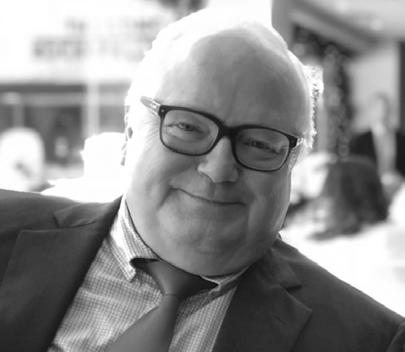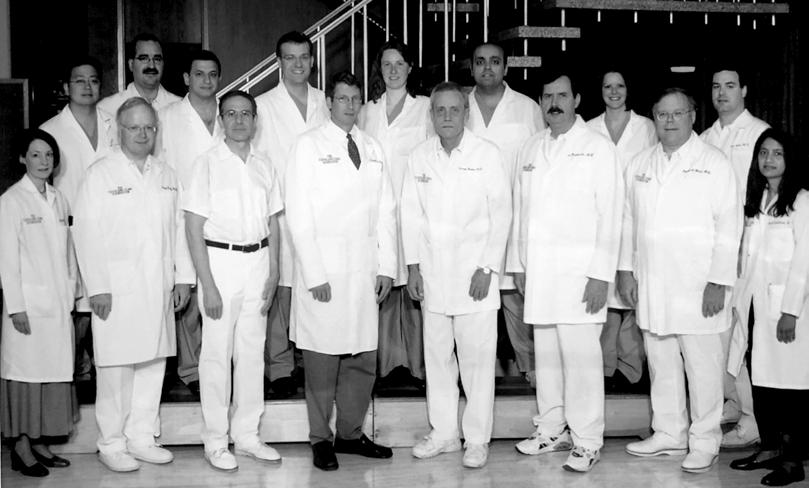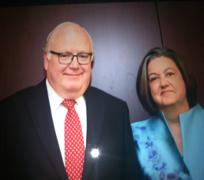
5 minute read
Dedicated Cleveland Clinic Vascular Surgeon and Leader Terry King, MD, Retires
By Mark K. Grove, MD
Terry King, MD, of Cleveland Clinic Florida’s Department of Vascular Surgery, retired from a 37-year career in vascular surgery on December 1. Dr. King, a native of Pittsburgh, grew up in a family with five children and parents who had met during flight school in the early 1940s. In high school his interests varied from sports to music. He became a varsity wrestler and was an early devotee of rock ‘n’ roll. In addition to these activities and his academic pursuits, he delivered newspapers and groceries from a local grocery store.
The early years of education
After graduating from high school, Dr. King matriculated at the University of Pittsburgh, triple-majoring in biophysics, microbiology and economics. Notwithstanding the rigorous academic demands, he had time to “play” while at Pitt, as a guitarist in several bands.
Following graduation, Dr. King stayed in Pittsburgh to attend Pitt’s School of Medicine. There, he was inspired by Henry “Hank” Bahnson, MD, a pioneer in cardiothoracic surgery. Dr. Bahnson later recruited Tom Starzl, MD, PhD, who developed the world-renowned liver transplant program at Pittsburgh. It is noteworthy that a number of Cleveland Clinic’s transplant surgeons have had their training at the University of Pittsburgh.
A career in medicine takes shape
After receiving his medical degree from University of Pittsburgh School of Medicine in 1977, the newly minted doctor moved a few hours west and started his surgical training at University Hospitals (UH) of Cleveland. As a general surgery resident at UH, Dr. King was influenced by Jerry Shuck, MD, who later became chairman of the American Board of Surgery. Just a few months into internship at UH he met a young nurse named Diane Conner and, by the third year of his residency, Diane and Dr. King were married.
After completing his year as chief resident in general surgery, Dr. King started a coveted fellowship at Northwestern University, one of the bastions of the developing field of vascular surgery. The late John Bergan, MD, and “Jimmy” Yao, MD, were at the forefront of academic vascular surgery in this era and among the literati in the field, authoring a number of the authoritative and popular texts in the 1980s. Dr. King co-authored a number of book chapters in these textbooks and gained tremendous experience in management of all aspects of vascular disease in this busy vascular center, under the tutelage of these experts. One of his co-fellows was Linda Graham, MD, also now a staff member in the Department of Vascular Surgery at Cleveland Clinic’s main campus in Cleveland.
After finishing his fellowship in Chicago in 1983, Dr. King moved his growing family to Washington, DC, where he became an attending surgeon on the teaching service at George Washington Medical Center and the DC Veterans Affairs Medical Center.
Dr. King was then recruited by Jeffrey Ponsky, MD, to join the Department of Surgery at Mt. Sinai Hospital in Cleveland, where he served as Head of the Section of Peripheral Vascular Surgery.
In 2000, Dr. King began his affiliation with Cleveland Clinic when he was recruited to the Department of Vascular Surgery. This happened during a period of tremendous expansion of Cleveland Clinic in Cleveland and the surrounding areas, spearheaded by CEO Floyd Loop, MD. In addition to Cleveland Clinic’s main campus, Dr. King operated at Hillcrest Medical Center, Marymount Medical Center and Euclid Medical Center. He also saw patients and performed outpatient procedures at the Beachwood and Strongsville family health centers.
Four years later, Dr. King was given the opportunity to join the staff at the nascent Cleveland Clinic in
Naples, Fla. The last of Dr. King’s children had gone off to college, and Dr. and Mrs. King were prepared to move once again. Dr. King built the endovascular and vascular surgical practice at Cleveland Clinic Naples. When a decision was made to close the Naples clinic and hospital a few years later, Dr. King elected to stay with the group that assumed control of the hospital, as did a number of the former Cleveland Clinic staff. He practiced at Physicians Regional Medical Center from 2006 to 2009.
A pioneer and leader at Cleveland Clinic Florida
Dr. King was recruited to join Cleveland Clinic Florida in 2009 to expand the endovascular surgery practice here in Weston. He performed the first endovascular repair of a thoracic aortic aneurysm at Cleveland Clinic Florida. Dr. King’s experience and administrative talents were quickly recognized, and he became Chairman of the Division of Surgery at Cleveland Clinic Florida, until the organization morphed into the institute model in 2014.
Dr. King’s tenure at Cleveland Clinic Florida over the past 12 years has been the culmination of a career characterized by superb patient care and the deft application of surgical skills honed over four decades. He delighted in mentoring surgical residents and imparting his vast knowledge of vascular disease to medical students. He was recognized by the surgical residents as Teacher of the Year. Dr. King was also particularly mindful and supportive of the efforts of all caregivers and support staff and stressed the importance of teamwork in providing the world-class care which has become the standard of Cleveland Clinic.
Dr. King’s dedication to patient care and to training the next generation of surgeons is underscored by his wife’s observation that he “never once called in sick from medical school, through residency, fellowship or as an attending. That included over 8,000 days on call!”
Dedication to his field and his family
Mrs. King also recently retired from her position as Senior Director of Quality and Safety at Cleveland Clinic Florida. She and Dr. King plan to remain very busy in their newfound retirement. In addition to spending quality time with their grandchildren, they plan to travel. Dr. King hopes to rekindle his prior interest in music and to pursue his passion for woodworking. We, in the Department of Vascular Surgery, are also hopeful that Dr. King will continue to remain involved in clinical care and teaching on a part-time basis.
Dr. King recently reflected on his decision to become a surgeon, noting “…it is all I ever wanted to do, to become a doctor, to make a difference, to use my mind and my hands to help people. I think I have made some lives better, less burdensome, bought some time for some, cured some, and had a lot of fun and satisfaction along the way. I would not change a thing.”
Dr. King’s retirement was commemorated by a tribute in November with limited in-person attendance comprised of his immediate family, closest colleagues, caregivers, and surgical trainees. The event was also live-streamed, bringing forth a “virtual” outpouring of congratulations from those who have been an important part of Dr. King’s career from across the United States.


Dr. King’s wife, Diane, was a familiar face at Cleveland Clinic Florida where she served as Senior Director of Quality and Safety prior to retiring in early 2020.










